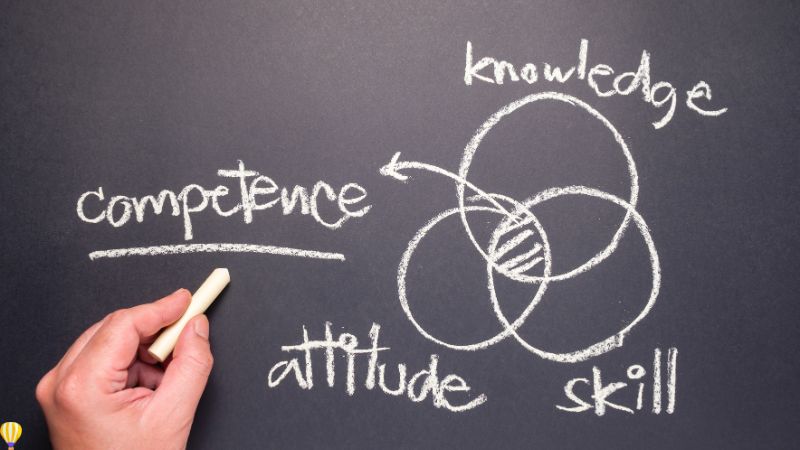Confidence unlocks countless doors in your personal and professional life. When you are confident, you are more likely to take risks, pursue your goals, and embrace new experiences. Confidence helps you bounce back from setbacks, handle criticism with grace, and keep moving forward, no matter what obstacles you encounter.
Picture yourself speaking up in meetings, sharing your ideas without hesitation, and knowing that your voice matters.
Think about the opportunities that open up when you trust in your abilities and approach each day with a sense of purpose and self-assurance.
Benefits of Confidence
This is the power of confidence.
In relationships, confidence allows you to communicate effectively and assertively, fostering stronger connections and mutual respect.
In the workplace, it positions you as a leader and a problem-solver, someone who is not afraid to take initiative and make decisions.
In your personal life, confidence empowers you to step out of your comfort zone, try new things, and live a fuller, more enriched life.
And confidence can be developed and strengthened over time. Confidence is about believing in your worth and abilities, and knowing that you have the power to achieve great things.

5 Ways to Boost Your Confidence
In this guide, we will explore five easy ways to help you build and maintain confidence. You’ll learn how to face your fears, set achievable goals, celebrate small wins, and much more.
Know Your Dream
What makes something the first, second, or even thousandth step in your journey is your utmost dream. Your biggest dream is your driving force. It is the reason you do what must be done.
Without a clear dream, it’s easy to stay in your comfort zone. But staying in the corner or playing it safe won’t make you confident.
To build true confidence, you must know what you are striving for and why.
Imagine your dream as a guiding star. It’s always there, showing you the way, even when the path gets tough. When you know your dream, you have a reason to push through the fear and discomfort.
You have a reason to step out of your corner and take risks. Knowing your dream gives you the motivation to face challenges head-on.
One of the most powerful things you can do is to write down your dream.
Make it real. Describe it in detail. How will your life look when you achieve it? How will you feel? What will you be doing? The more vivid your dream, the stronger your motivation will be. This clarity will fuel your journey and build your confidence.
Next, break your dream down into smaller, manageable goals. Each goal is a step towards your dream. By achieving these smaller goals, you build momentum and confidence. You see progress, and this keeps you motivated.
Every big dream is just a series of small steps taken consistently.
Knowing your dream also helps you stay focused. It’s easy to get distracted by the noise of everyday life. But when you have a clear dream, you can filter out the distractions.
You can say no to things that don’t align with your dream and yes to things that do. This focus is crucial for building confidence and making steady progress.
Your dream gives you a sense of purpose. It makes your efforts meaningful. When you know why you’re doing something, it’s easier to stay committed.
Even when things get tough, your dream reminds you of what you’re working towards. This sense of purpose boosts your confidence because you know you’re on the right path.
As you work towards your dream, you’ll face obstacles. This is normal. But with a clear dream, these obstacles become challenges to overcome, not barriers to stop you.
Each challenge you face and conquer builds your resilience and confidence. You prove to yourself that you can handle whatever comes your way.
Sharing your dream with others can also boost your confidence. Talk about it with friends, family, or mentors. Their support and encouragement can keep you motivated.
They can offer advice and help you stay accountable. Knowing that others believe in your dream can make you believe in it even more.
Read also: 10 Ways to Become More Confident
Face Your Fears
Let’s talk about facing your fears. This might sound scary, but it’s one of the best ways to build confidence.
When you face your fears, you take away their power.
I name my fears. It helps me fear less.
Naming your fears makes them clear and concrete. When you know what you’re really afraid of, you can figure out what to do about it.
Many people fear public speaking. It’s a common fear, but it’s also a perfect example of how naming your fears can help.
When you think about public speaking, what exactly scares you? Is it the idea of standing in front of a crowd? Is it the fear of forgetting your words? Or maybe it’s the worry about being judged? By naming these specific fears, you take the first step in gaining control.
When I name my fears, I feel like I’m taking the driver’s seat. I become the master of my fears instead of letting them control me.
Let’s go back to the fear of public speaking. Once you know what part of it scares you, you can take steps to tackle each fear. If you’re scared of forgetting your words, practice more. If you worry about being judged, focus on your message and how it can help your audience.
Naming your fears doesn’t mean they’ll disappear overnight. But it does mean you can start working on them. Think of it like shining a light in a dark room. The darkness might have made you scared, but once you see what’s in the room, you can deal with it. Naming your fears is like turning on that light.
Let’s say you’re afraid of failure. What does that mean for you? Does it mean losing money? Embarrassment? Disappointment? Once you name these specific fears, you can create a plan.
If you’re worried about losing money, maybe you can set aside a safety net. If you’re scared of embarrassment, remember that everyone fails sometimes. It’s part of learning and growing.
Another thing to remember is that fear often comes from the unknown.
When you name your fears, you turn the unknown into something known. This makes it less scary. You can research, prepare, and plan. The more you know, the less there is to fear.
You might be thinking, “Naming my fears is easier said than done.” And you’re right. It takes courage to face what scares you. But every time you do, you get a little bit stronger.
Start with small fears and work your way up to bigger ones. Celebrate each victory along the way.
Fear can be a powerful motivator, but it can also be a huge roadblock.
When you face your fears head-on, you break down that roadblock. You open up new opportunities for growth and success. You become more confident in your ability to handle whatever comes your way.
So, take a moment to think about your fears. Write them down. Name them. Then, start thinking about what you can do to tackle each one.
You’re not alone in this. Everyone has fears. The difference is how you deal with them.
By facing your fears, you build resilience. You prove to yourself that you can handle challenges. This builds confidence over time. Each fear you face makes you stronger for the next one.

Commit to Competence
To be confident, it is important to be competent. And this is easier than most people imagine. Confidence isn’t some mysterious trait you’re born with; it’s something you build through competence.
You have clear and compelling dreams. The next step is to commit.
Committing means taking that first step. Then, you need the courage to take the second, third, and fourth steps. Every step you take builds your competence and, in turn, your confidence.
The secret to competence is simple.
Know what knowledge and skills you need to perform at your best. You don’t have to master a thousand skills. Find the one skill that will make the biggest difference. Focus on that skill. Practice it. Do it again, and again, and again. Learn from your experience each time.
Think about it this way: if you want to be a great public speaker, you don’t need to know everything about communication. Start with one skill, like storytelling. Get good at telling a story that captivates your audience. Practice it until you can do it effortlessly. Then, move on to the next skill, like using body language effectively.
Confidence comes with competence. When you know you have the skills to perform well, your confidence naturally increases. It’s about looking at your past experiences and seeing that you’ve done it before. If you’ve done it once, you can do it again. This mindset turns your previous successes into a solid foundation for future confidence.
Remember, you don’t become competent overnight. It’s a journey.
But each day, as you practice and improve, you become a bit more skilled and a bit more confident. Competence isn’t about perfection; it’s about progress. Aim to get a little better each day, and over time, you’ll see significant improvement.
One way to build competence is to seek feedback.
Don’t be afraid to ask others for their input. Constructive criticism can be incredibly valuable. It shows you areas where you can improve and helps you refine your skills. Embrace feedback as a tool for growth, not as a personal attack.
Also, remember to reflect on your experiences.
After each attempt, take a moment to think about what went well and what could be better. This reflection helps you learn and adapt. It’s a crucial part of building competence.
Another key is perseverance. There will be times when you face challenges and setbacks. Don’t let these discourage you.
Keep pushing forward. Each obstacle is an opportunity to learn and grow. The more you persevere, the more resilient and competent you become.
Celebrate your progress, no matter how small. Recognize each step forward as a victory. These celebrations keep you motivated and remind you of how far you’ve come. They reinforce your commitment to your dream and your journey to competence.
Confidence is about believing in your ability to succeed. This belief comes from knowing you’re competent. By focusing on building your skills and learning from every experience, you lay the foundation for lasting confidence.
So commit to your dream, take that first step, and keep going. Aim to be competent each day, and watch as your confidence grows.
Celebrate Small Wins
What will make you continue learning and be competent? Always celebrate small wins.
Celebrating small victories keeps you motivated and focused on your growth. It’s a powerful way to build confidence and competence over time.
That’s how I learned public speaking. I joined Toastmasters for that purpose. Every time I delivered a speech, I got evaluated. No speech is ever perfect. There is always room for improvement. The evaluator will always find areas where I can improve.
Some speakers focused on what they missed. They got discouraged by their mistakes and lost sight of their progress. But I focused on what I accomplished. I had specific performance targets for each speech. My evaluators didn’t know my targets; sometimes, I shared them, but not always, as each speech had a unique objective. I listened to the feedback and learned from it.
But I also learned how to celebrate small wins. Recognizing these small victories kept me motivated. When I achieved a goal, no matter how small, I celebrated. It could be something as simple as delivering a speech without forgetting my lines or effectively using a new technique I had practiced.
There are many ways to celebrate small wins.
One way is to keep a journal. Write down your achievements, no matter how minor they may seem. Reflecting on these entries can remind you of your progress and boost your confidence.
Another idea is to share your successes with others. Tell a friend or a mentor about your achievements. Their positive feedback and encouragement can reinforce your sense of accomplishment. Plus, sharing your wins can inspire others to recognize and celebrate their progress too.
You can also reward yourself. Treat yourself to something special when you reach a goal. It doesn’t have to be extravagant. It could be a favorite meal, a movie night, or a small purchase you’ve been wanting. The reward gives you something to look forward to and makes your efforts feel worthwhile.
Visual reminders can be powerful too. Create a vision board with pictures and notes about your goals and achievements. Seeing these reminders every day can keep you focused and motivated. It’s a visual celebration of your journey and progress.
Set milestones and celebrate when you reach them. Break down your larger goals into smaller, achievable milestones. Each time you reach a milestone, take a moment to acknowledge your success. This keeps you motivated and moving forward.
Be kind to yourself when things don’t go perfectly. Celebrate your efforts and the courage it took to try, even if the outcome wasn’t exactly what you hoped for.
Recognizing your efforts is just as important as celebrating your successes.

Be of Service to Others
Most of my examples are about public speaking, but these tips on how to be confident apply to other areas of our lives as well. Confidence isn’t limited to one field; it’s a universal trait that can be cultivated in many different contexts.
I realized that it is important that my goal isn’t just about me. My goals must serve others.
When you focus on helping others, you gain a sense of purpose that transcends your fears and insecurities. Your motivation grows stronger because you know that your efforts can make a positive impact on someone else’s life.
You won’t find this advice everywhere. Yes, I am not tactical in my advice, but I tell you, this works. Think of the big picture.
When your actions are aimed at benefiting others, you tap into a deeper source of motivation and drive. This big-picture thinking helps you push through challenges and stay committed to your goals.
You can find tactical advice everywhere. There are countless tips on how to improve your skills, overcome obstacles, and stay motivated. But trust me, when you do something that will benefit others, you will be more motivated to do something you have not done before.
The desire to help others gives you the courage to step out of your comfort zone and try new things.
Again, confidence is about doing something you have done before. It’s about having the experience and knowing that you can succeed because you’ve succeeded before.
And the way to do that is to do things again and again until you become confident. Repetition and practice build familiarity, which in turn builds confidence.
This is not a case of “Bahala na,” a Filipino phrase that means leaving everything to fate. No, confidence means “kaya ko yan,” which translates to “I can do it.” It’s about taking control, believing in your abilities, and knowing that you have what it takes to succeed.
When your goal is to serve others, this belief becomes even stronger.
When you aim to serve others, your focus shifts from your fears to the needs of those you want to help. This shift in focus can diminish your anxieties and boost your confidence. You become more determined to succeed, not just for yourself, but for the benefit of others.
Think about the impact you can have. Whether it’s in public speaking, your career, or any other area of life, your efforts can make a difference. When you see the positive effects of your actions on others, your confidence grows.
You realize that you are capable of making meaningful contributions, and this realization fuels your confidence even more.
So, set goals that serve others. Think about how your actions can benefit those around you. Whether it’s mentoring a colleague, volunteering in your community, or simply offering support to a friend, these acts of service can boost your confidence.
Remember, true confidence comes from knowing that you are making a positive impact in the world.
Embrace Your Confidence Journey
Building confidence is a journey, not a destination. Take consistent steps, embrace challenges, and celebrate progress along the way.
As you implement the strategies we’ve discussed—facing your fears, knowing your whys, celebrating small wins, and being of service to others—you will start to see a transformation.
Each step you take will bring you closer to becoming the confident person you aspire to be.
Focus on growth, embrace new experiences, and constantly learn.
Whatever it is, take that step with confidence and know that each action you take is a building block toward a more confident you.
As you move forward, keep the bigger picture in mind. Your journey to confidence will not only benefit you but also those around you. Your newfound self-assurance will inspire and uplift others, creating a ripple effect of positivity and empowerment.
So, embrace your confidence journey with open arms. Take the first step, and then the next, and watch as your life transforms.
You have the potential to achieve great things, and the world needs your unique talents and strengths. Believe in yourself, stay committed, and let your confidence shine.
Begin now.
Don’t wait for the perfect moment to start building your confidence—begin now. Choose one strategy from this guide and put it into practice today.
Share your progress with a friend or mentor, and keep track of your achievements. Celebrate each small win, and let it fuel your motivation to keep going.
Confidence is a journey, and every step you take brings you closer to becoming the confident, capable person you were meant to be.
Start now, stay committed, and watch your confidence soar. The world is waiting for you—take the leap and embrace your full potential!
If you’re tired of knowing but not doing…
Let’s make one shift easier to live daily.
→ Shift Experiences



Let me tell you why I’m so confident about myself. During my time studying in a Catholic seminary, I had a lot of time for reflection. Those who know me know that I love digging into the meaning of words through their roots. One day, I realized that the word “confident” comes from a root word that means “faith.” The prefix “con” indicates someone shares that faith in me. This discovery was a game-changer.
Just like you, I was created in the image of God. I am a miracle, and I am valuable. This profound realization helped me correct my flawed thinking that I wasn’t good enough. The truth is, you and I are good enough, and we have the power to make a difference in this world.
So, whenever you doubt yourself, remember this: You were made with a purpose. You are more than enough, and your potential is limitless. Embrace your worth, have faith in yourself, and let’s change the world together.